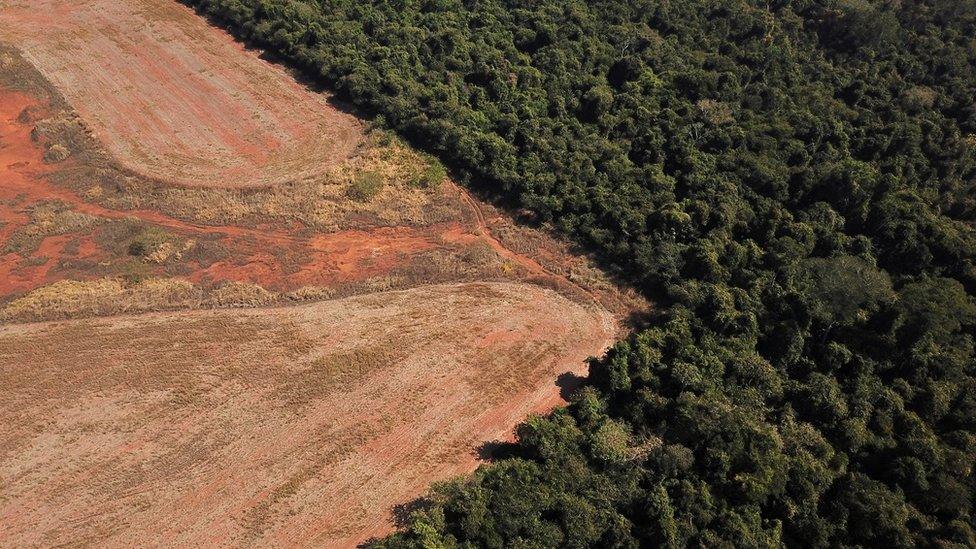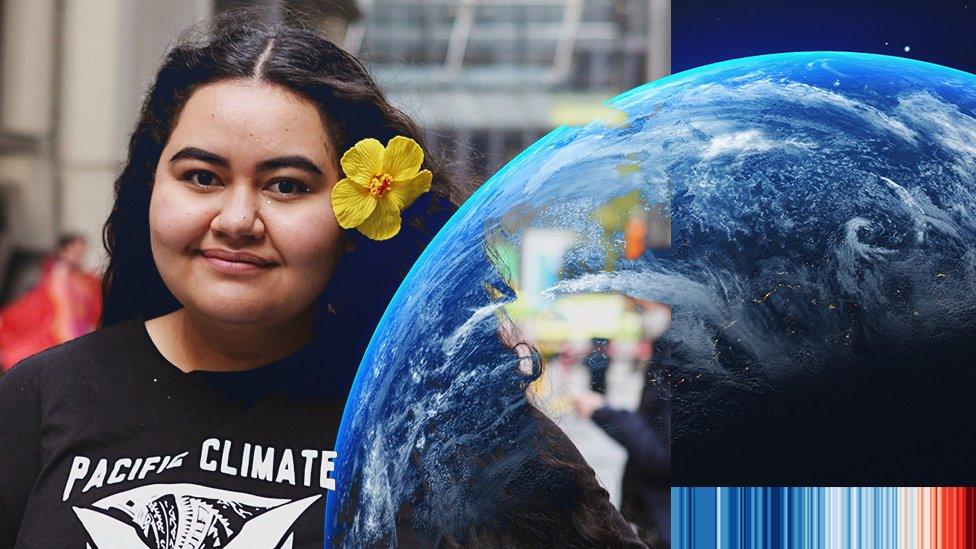COP26: Pledge to end deforestation as Queen urges 'rise above politics'
- Published
Here are five things you need to know about the COP26 climate change conference on Tuesday.

1. World leaders promise to end deforestation by 2030
In the COP26 summit's first major deal, more than 100 world leaders will promise to end and reverse deforestation by 2030. The commitment, with almost £14bn pledged in public and private backing, is supported by nations covering about 85% of the world's forests, including Canada, Brazil, Russia, Indonesia and the Democratic Republic of the Congo. But analysts warn a deal struck in 2014 "failed to slow deforestation at all". Felling trees contributes to climate change because forests absorb vast amounts of the warming gas CO2.


2. Act now for our children, Queen urges
In a video message to the summit in Glasgow, the Queen urged world leaders to create a "safer, stabler future" for the planet. She told them to take the long view and "rise above the politics of the moment". Among Monday's other key developments:
India pledged a net-zero target for 2070 - 20 years later than the summit target
An Israeli minister said she could not attend because the venue was not wheelchair accessible
Naturalist Sir David Attenborough urged delegates to "turn tragedy into triumph"
US President Joe Biden said delegates must "seize the moment" - but was later spotted resting his eyes
"The time for words has now moved to the time for action" – watch the Queen's video message to world leaders

3. Thunberg tells protest politicians are pretending
The arrival of world leaders has triggered a series of demos across Glasgow, with environmental campaign Greenpeace sailing its Rainbow Warrior ship up the Clyde and Extinction Rebellion protesters welcoming delegates at Central station. Swedish climate activist Greta Thunberg told an event near the COP26 campus by the Fridays for Future youth movement that politicians were merely "pretending to take our future seriously".
Swedish climate activist Greta Thunberg says politicians at COP26 are "pretending to take our future seriously"

4. The negotiators at the heart of COP26
A lot of big-hitters might be in Glasgow but if anything positive is to come out of the summit, there's a good chance it will be thanks to the hard work of people whose name you might never have heard. Environment correspondent Matt McGrath runs through five dealmakers whose efforts will be crucial during negotiations.
The BBC’s Science Editor David Shukman takes a look behind the scenes at COP26

5. 'Attenborough and Biden... the only faces I could make out'
"It felt great to be heard," Samoan climate activist Brianna Fruean, 23, says after addressing world leaders at the opening of COP26. "The words I shared didn't just belong to me - they belong to my community, they belong to every single Pacific island." Brianna has been campaigning since a teacher at primary school told her climate change might cause islands such as Samoa, Tutuila in American Samoa and Tonga to "drown". Read her first-person account - the first in our series.



And there's more...
Ever wondered about the obsession with the figure 1.5C? The rapid climate change we are seeing now is caused by humans using oil, gas and coal for their homes, factories and transport. When these fossil fuels burn, they release greenhouse gases - mostly carbon dioxide (CO2) - that trap the Sun's heat and cause the planet's temperature to rise.
The world is now about 1.2C warmer than it was in the 19th Century - and the amount of CO2 in the atmosphere has risen by 50%. In order to avoid the worst consequences of climate change, scientists say global warming needs to be limited to 1.5C by 2100.

You can find further information on our climate page.


What questions do you have about changes in our climate?
In some cases your question will be published, displaying your name, age and location as you provide it, unless you state otherwise. Your contact details will never be published. Please ensure you have read our terms & conditions and privacy policy.
Use this form to ask your question:
If you are reading this page and can't see the form you will need to visit the mobile version of the BBC website to submit your question or send them via email to YourQuestions@bbc.co.uk, external. Please include your name, age and location with any question you send in.